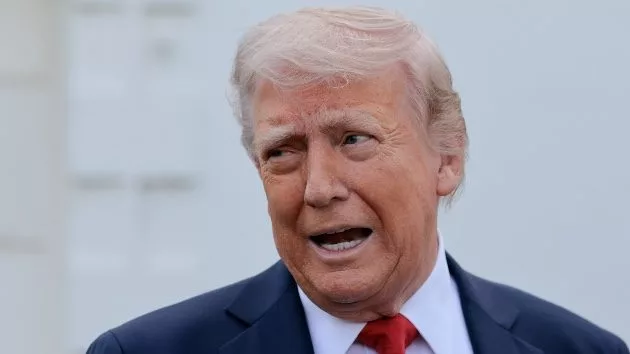
(WASHINGTON) — President Donald Trump, upon his return to the White House, appears to have quickly turned one of his more ominous campaign promises into reality.
Among his first acts after being sworn in inside the Capitol Rotunda was to strip the security clearances from 51 former intelligence officials who signed a letter during the 2024 campaign describing a news story abut the public release of emails from Hunter Biden’s laptop as potentially part of a Russian disinformation operation.
In the days that followed, he removed protective details for former officials who received threats over their work, including retired Gen. Mark Milley, Dr. Anthony Fauci, former Secretary of State Mike Pompeo and others. Trump’s reasoning at the time was, “You can’t have a security detail for the rest of your life.”
Trump told supporters at his first 2024 rally, back in March 2023: “I am your retribution.”
Now, 100 days into his second term, his list of targets appears to be growing. And much of the action is aligned with his own political interests.
“He’s really taking it to the next level,” said Nick Akerman, a former federal prosecutor who helped investigate President Richard Nixon during the Watergate scandal.
Some predictable Trump targets have included former President Joe Biden and former Vice President Kamala Harris, whose access to classified information he revoked. (While it is the norm for former presidents to receive briefings, the move against Biden came after Biden stripped Trump of having access to them in 2021, citing his “erratic behavior.”)
Trump’s list of his critics who he said should no longer have access to classified material also included Hillary Clinton, his 2016 opponent; former Republican Reps. Liz Cheney and Adam Kinzinger, who investigated his role in the Jan. 6 Capitol attack; New York Attorney General Letitia James, who prosecuted his company for fraud; and Manhattan District Attorney Alvin Bragg, who led the hush money case against Trump that resulted in the first-ever criminal conviction of a former president.
Trump also signed executive orders against some of the nation’s top law firms.
Perkins Coie, which represented Clinton’s 2016 campaign, was the subject of an order mandating its lawyers have their security clearances stripped. The executive action also sought to terminate any government contracts that might exist with the firm or other entities that it represents, bar agencies from hiring employees of Perkins Coie and prohibit the firm’s staff from accessing government buildings.
Trump also took aim at WilmerHale, which has ties to former special counsel Robert Mueller, with an order alleging it engages in “conduct detrimental to critical American interests” in its pro-bono work. Trump ordered his administration to suspend the security clearances of WilmerHale employees and also requires government contractors to disclose any business they do with the law firm.
Richard Painter, who served as a White House ethics lawyer in the George W. Bush administration, criticized Trump’s attacks on law firms as an affront to the rule of law.
“The executive orders against law firms are a fundamental infringement on the right to counsel and the right of lawyers to represent clients of their choice without retribution by the government,” Painter said.
“The First Amendment right to petition the government for redress of grievances includes the right to legal representation in court for anybody, even Democrats,” Painter added.
Several universities have found themselves in Trump’s crosshairs as his administration made demands regarding campus policies and governance. Harvard University, after refusing, had $2.2 billion in federal grants frozen.
News media, too, hasn’t been spared.
The Associated Press was barred from White House events because the outlet wouldn’t refer to the Gulf of Mexico only as the “Gulf of America,” after Trump’s order renaming the body of water, though the outlet appeared to gain back some access as the White House instituted a new policy lumping wire service reporters into a broader collective of print outlets. The White House has also suggested funding for NPR and PBS, which Trump accused of being left-leaning, is a waste of taxpayer money.
Trump signed orders directing the Department of Justice to investigate two individuals who worked in his first administration who became outspoken critics of his leadership.
Chris Krebs, resigned from his job at a private cybersecurity firm after Trump directed Attorney General Pam Bondi to review Krebs’ actions while leading the Cybersecurity and Infrastructure Agency (CISA) — a job Trump appointed him to in 2017. Krebs has long assured the 2020 election was secure, criticizing Trump for spreading debunked claims of election fraud.
“For those who know me, you know I don’t shy away from tough fights. But I also know this is one I need to take on fully — outside of SentinelOne,” Krebs said in a social media post announcing his resignation. “This will require my complete focus and energy. It’s a fight for democracy, for freedom of speech, and for the rule of law. I’m prepared to give it everything I’ve got.”
Miles Taylor, the deputy chief of staff to former Homeland Security Secretary Kirstjen Nielsen, was also the target of an order from Trump directing the Justice Department to launch an investigation as Trump alleged he may have committed “treason.”
Taylor penned a 2018 New York Times op-ed describing Trump as “detrimental to the health of our republic” and a 2019 book about the first administration under the pseudonym “Anonymous” before going public in 2020.
Trump’s targeting of various individuals and institutions come after he, for years, accused President Joe Biden of weaponizing law enforcement.
“Those days are over and they are never going to come back. They’re never coming back. Now, as the chief law enforcement officer in our country, I will insist upon and demand full and complete accountability for the wrongs and abuses that have occurred,” Trump said as he spoke at the Justice Department in March.
Republicans have praised some of Trump’s moves, namely against universities and some news outlets.
“The vast majority of the American people do not want to prop up these institutions,” Republican Rep. Elise Stefanik said when the Trump administration made demands of Harvard and other schools. Stefanik added, “Higher education has fundamentally lost its way, and it’s increasingly out of touch, and the tuition rates go higher and higher. So we need to defund across the board, and President Trump is rightly holding these schools accountable.”
House Speaker Mike Johnson, while criticizing NPR and PBS, said, “The American people support the free press, but will not be forced to fund a biased political outlet with taxpayer funds.”
But critics said it’s Trump who is wielding the powers of the presidency to go after political opponents in sweeping fashion.
“All of these things are much more blatant and much more out in the open,” Akerman said, attributing Trump’s boldness, in part, to the Supreme Court’s blockbuster ruling last year granting presidents some immunity from criminal prosecution for official acts.
Painter’s message for Trump, as a former White House ethics chief: “He’s got to focus on carrying out his agenda as president, not just going after his personal enemies and political enemies.”
“Using the presidency to go after political enemies is a very dangerous thing, very dangerous for democracy, and he shouldn’t be doing that,” Painter said.
Copyright © 2025, ABC Audio. All rights reserved.







